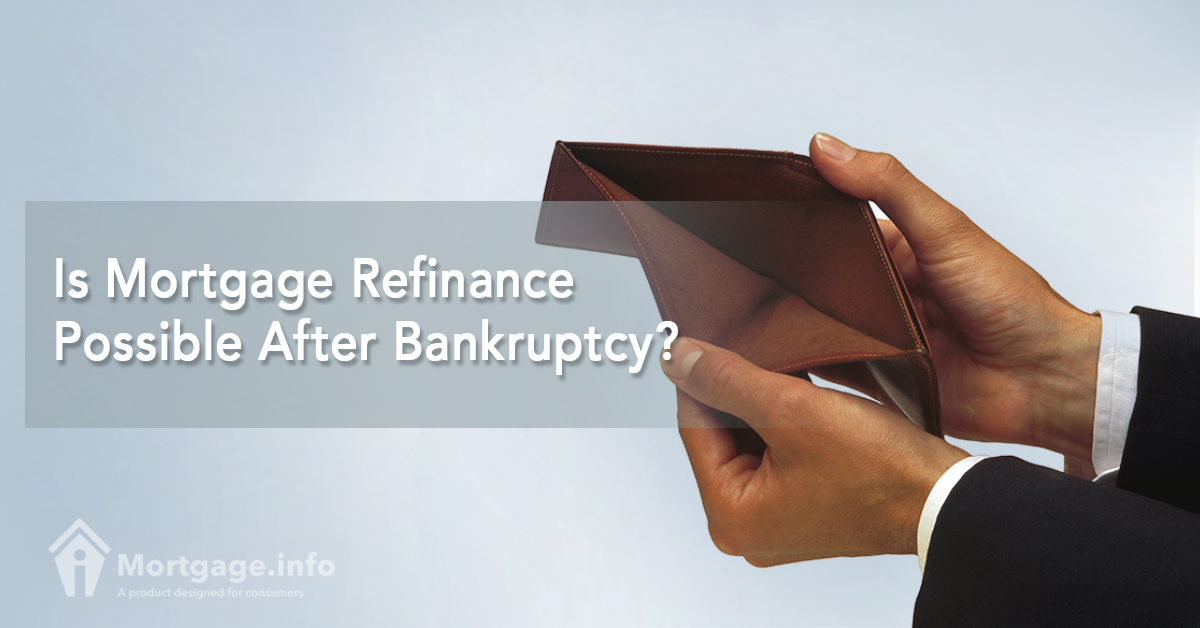Yes, it may be difficult but it is possible to refinance your mortgage after bankruptcy. The key is to rebuild your credit profile by establishing good credit and find out the relevant waiting periods required by conventional and government-backed mortgage programs. While there’s no easy road to refinancing post-bankruptcy, it doesn’t hurt to try especially if you have changed for the better, credit-wise.
Chapter 7 vs Chapter 13 Bankruptcy
For starters, your refinance options and the process you have to undertake would depend on what kind of bankruptcy you have filed for:
- “Chapter 7 bankruptcy provides for ‘liquidation’ – the sale of a debtor’s nonexempt property and the distribution of proceeds to creditors,” as defined in uscourts.gov. In a matter of months, a Chapter 7 bankruptcy can be discharged.
- “Chapter 13 bankruptcy provides for adjustment of debts of an individual with regular income. Chapter 13 allows a debtor to keep property and pay debts over time, usually three to five years,” as per uscourts.gov definition.
A Chapter 7 bankruptcy doesn’t require a repayment plan as the assets would be liquidated, including equity in the home if it is significant. If there’s no equity, the property is exempt from the sale. In this way, a Chapter 7 debtor can still keep his/her home during bankruptcy.
In contrast, a Chapter 13 bankruptcy requires the debtor with a regular income to develop a plan that contemplates making installment payments to creditors over a three- to five-year period. This helps a Chapter 13 debtor save his/her home from foreclosure by curing delinquent mortgage payments and making timely payments as required under the Chapter 13 plan. Indeed, even while during bankruptcy, it is possible to refinance his/her mortgage.
Post-Bankruptcy Refinance Options
It’s important to get your life back together, credit especially, after being discharged from bankruptcy or while during bankruptcy as in the case of Chapter 13. Because while bankruptcy filings can remain in your credit file for a number of years, it doesn’t mean that you’d be shut out of mortgage financing, whether purchase or refinance, forever.
All things being equal, your re-established credit can possibly qualify you for any of the refinance programs offered by Fannie Mae and FHA, as applicable.
Fannie Mae
Fannie Mae requires a certain number of years before a borrower with a derogatory credit event can tap its mortgage financing:
- Chapter 7 bankruptcy – Four years. This period may be lowered to two years if the borrower shows an “extenuating circumstance”.
- Chapter 13 bankruptcy – (i) Two years from the discharge date and (ii) four years from the dismissal date, which can also be lowered to two years, subject to extenuating circumstances.
Moreover, if your mortgage (owned either by Fannie Mae or Freddie Mac), has little to no equity or underwater but is current with only one late payment during the last 12 months, the Home Affordable Refinance Program® is a worthwhile opportunity. HARP® requires the loan-to-value ratio to be higher than 80%.
See today’s rates.
FHA
For Chapter 7 bankruptcy, the Federal Housing Administration (FHA) makes clear that borrowers can qualify for its insured mortgages if at least two years have elapsed since the bankruptcy discharge date. A good credit and/or non-incurrence of new credit obligations is required by FHA.
The waiting period can be less than two years but should not be less than one year if the borrower has shown that the bankruptcy filing was due to an extenuating circumstance beyond his/her control and that he/she was able to get his financial affairs in order since the bankruptcy, as documented.
With respect to Chapter 13 bankruptcy, the FHA can allow a borrower to tap its mortgage financing provided that there is lender documentation showing that:
- It has been a year since the pay-out period under the Chapter 13 bankruptcy;
- The borrower has shown satisfactory payment history, having made all required payments on time.
- The bankruptcy court has permitted the borrower, through a written order, to enter into a mortgage-related transaction.
That being said, do take note of your equity and be patient in finding lenders to refinance.

